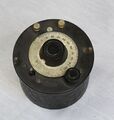558: Difference between revisions
Jump to navigation
Jump to search
No edit summary |
No edit summary |
||
| Line 15: | Line 15: | ||
The {{Title|General Radio 558 Amateur Band Frequency Meter}} was introduced in {{Bulletin 930}} and {{Catalog E1}} / {{Catalog E2}}. | The {{Title|General Radio 558 Amateur Band Frequency Meter}} was introduced in {{Bulletin 930}} and {{Catalog E1}} / {{Catalog E2}}. | ||
The Type 558 is an absorption type wavemeter covering the five popular amateur radio bands. | The Type 558 is an absorption-type wavemeter covering the five popular amateur radio bands. | ||
of the earlier [[358]] wavemeter | |||
It is an improved version of the earlier [[358]] wavemeter, targeted for amateur radio use with 0.25% accuracy as compared to 1% of the [[358]], and the inclusion of fifth VHF band coil. Each wavemeter is supplied with a calibration chart produced with settings accurate for that particular meter. | |||
The 558 uses a neon-type resonance indicator instead of the 358's incandescent lamp. | |||
==Specifications== | ==Specifications== | ||
Revision as of 15:15, 6 April 2024
The General Radio 558 Amateur Band Frequency Meter was introduced in Bulletin 930 (1928) and Catalog E1 (1928) / Catalog E2 (1928).
The Type 558 is an absorption-type wavemeter covering the five popular amateur radio bands.
It is an improved version of the earlier 358 wavemeter, targeted for amateur radio use with 0.25% accuracy as compared to 1% of the 358, and the inclusion of fifth VHF band coil. Each wavemeter is supplied with a calibration chart produced with settings accurate for that particular meter.
The 558 uses a neon-type resonance indicator instead of the 358's incandescent lamp.
Specifications
- Frequency Range: five bands, 3.5 to 4.0 MHz, 7.0 to 8.0 MHz, 14.0 to 16.0 MHz, 28 to 32 MHZ, 56 to 51 MHz
- Frequency Calibration Accuracy: 0.25%











